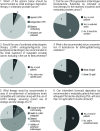Second brazilian consensus on the treatment of advanced prostate cancer - a SBOC-SBU-SBRT panel review
- PMID: 31038861
- PMCID: PMC6786127
- DOI: 10.1590/S1677-5538.IBJU.2018.0798
Second brazilian consensus on the treatment of advanced prostate cancer - a SBOC-SBU-SBRT panel review
Abstract
Prostate cancer is the second most common cancer and the fi fth leading cause of cancer deaths. In Brazil, it is likewise the second most common cancer among men, second only to non-melanoma skin cancers. The aim of this consensus is to align different opinions and interpretations of the medical literature in a practical and patient-oriented approach. The fi rst Brazilian Consensus on the Treatment of Advanced Prostate Cancer was published in 2017, with the goal of reducing the heterogeneity of therapeutic conduct in Brazilian patients with metastatic prostate cancer. We acknowledge that in Brazil the incorporation of different technologies is a big challenge, especially in the Sistema Único de Saúde (SUS), which allows for the disparity in the options available to patients treated in different institutions. In order to update the recommendations and to make them objective and easily accessible, once more a panel of specialists was formed in order to discuss and elaborate a new Brazilian Consensus on Advanced Prostate Cancer. This Consensus was written through a joint initiative of the Brazilian Society of Clinical Oncology (SBOC) and the Brazilian Society of Urology (SBU) to support the clinical decisions of physicians and other health professionals involved in the care of patients with prostate cancer.
Keywords: Consensus; Prostatic Neoplasms; Therapeutics.
Copyright® by the International Brazilian Journal of Urology.
Conflict of interest statement
None declared.
Figures
Similar articles
-
First Brazilian Consensus of Advanced Prostate Cancer: Recommendations for Clinical Practice.Int Braz J Urol. 2017 May-Jun;43(3):407-415. doi: 10.1590/S1677-5538.IBJU.2016.0490. Int Braz J Urol. 2017. PMID: 28199075 Free PMC article.
-
Consensus statements on the management of metastatic prostate cancer from the Hong Kong Urological Association and Hong Kong Society of Uro-Oncology.BJU Int. 2018 May;121(5):703-715. doi: 10.1111/bju.14091. Epub 2018 Jan 8. BJU Int. 2018. PMID: 29211320
-
Consensus on diagnosis and management of non-metastatic castration resistant prostate cancer in Brazil: focus on patient, selection, treatment efficacy, side effects and physician's perception according to patient comorbidities.Int Braz J Urol. 2021 Mar-Apr;47(2):359-373. doi: 10.1590/S1677-5538.IBJU.2020.0249. Int Braz J Urol. 2021. PMID: 33284538 Free PMC article.
-
[Advanced Prostate Cancer Consensus Conference 2017 : Discussion of the recommendations for diagnosis and treatment of metastatic prostate cancer by a German panel of experts].Urologe A. 2018 Jul;57(7):813-820. doi: 10.1007/s00120-018-0680-9. Urologe A. 2018. PMID: 29808368 German.
-
[Advanced Prostate Cancer Consensus Conference (APCCC) 2015 in St. Gallen : Critical review of the recommendations on diagnosis and therapy of metastatic prostate cancer by a German expert panel].Urologe A. 2016 Jun;55(6):772-82. doi: 10.1007/s00120-016-0030-8. Urologe A. 2016. PMID: 26820660 Review. German.
Cited by
-
Treatment of complex urethral stenosis in public centers from developing countries in 21st century.Int Braz J Urol. 2022 Mar-Apr;48(2):367-368. doi: 10.1590/S1677-5538.IBJU.2021.0499. Int Braz J Urol. 2022. PMID: 34156190 Free PMC article. No abstract available.
-
Perception of castration value over cost in the metastatic prostate cancer scenario: a contemporary pharmacoeconomic perspective.Int Braz J Urol. 2022 Jan-Feb;48(1):175-179. doi: 10.1590/S1677-5538.IBJU.2021.0258. Int Braz J Urol. 2022. PMID: 34115454 Free PMC article. No abstract available.
-
Investigation of radiomics models for predicting biochemical recurrence of advanced prostate cancer on pretreatment MR ADC maps based on automatic image segmentation.J Appl Clin Med Phys. 2024 Apr;25(4):e14244. doi: 10.1002/acm2.14244. Epub 2023 Dec 26. J Appl Clin Med Phys. 2024. PMID: 38146796 Free PMC article.
-
Editorial Comment: Acute prostatitis after prostate biopsy under ciprofloxacin prophylaxis with or without ornidazole and pre-biopsy enema: analysis of 3.479 prostate biopsy cases.Int Braz J Urol. 2020 Jan-Feb;46(1):67-69. doi: 10.1590/S1677-5538.IBJU.2019.0257.1. Int Braz J Urol. 2020. PMID: 31851460 Free PMC article. No abstract available.
-
The multiparametric prostate resonance imaging with the prostate imaging-reporting and data system (PI-RADS): the state of art of prostate cancer diagnosis.Int Braz J Urol. 2019 May-Jun;45(3):422-423. doi: 10.1590/S1677-5538.IBJU.2019.03.01. Int Braz J Urol. 2019. PMID: 31149788 Free PMC article. No abstract available.
References
-
- INCA. Instituto Nacional do Câncer. Estimativa 2018: Incidência de Câncer no Brasil. 2018. Accessed on 10/jul/2018, 2018. Available at. < https://www.inca.gov.br/publicacoes/livros/estimativa-2018-incidencia-de...>.
-
- Global Burden of Disease Cancer Collaboration. Fitzmaurice C, Akinyemiju TF, Al Lami FH, Alam T, Alizadeh-Navaei R, Allen C, et al. Global, Regional, and National Cancer Incidence, Mortality, Years of Life Lost, Years Lived With Disability, and Disability-Adjusted Life-Years for 29 Cancer Groups, 1990 to 2016: A Systematic Analysis for the Global Burden of Disease Study. JAMA Oncol. 2018;4:1553–1568. - PMC - PubMed
-
- Loblaw DA, Prestrud AA, Somerfield MR, Oliver TK, Brouwers MC, Nam RK, et al. American Society of Clinical Oncology Clinical Practice Guidelines: formal systematic review-based consensus methodology. J Clin Oncol. 2012;30:3136–3140. - PubMed
-
- Huggins C, Hodges CV. Studies on prostatic cancer. I. The effect of castration, of estrogen and androgen injection on serum phosphatases in metastatic carcinoma of the prostate. CA Cancer J Clin. 1972;22:232–240. - PubMed
MeSH terms
Substances
LinkOut - more resources
Full Text Sources
Medical
Miscellaneous

